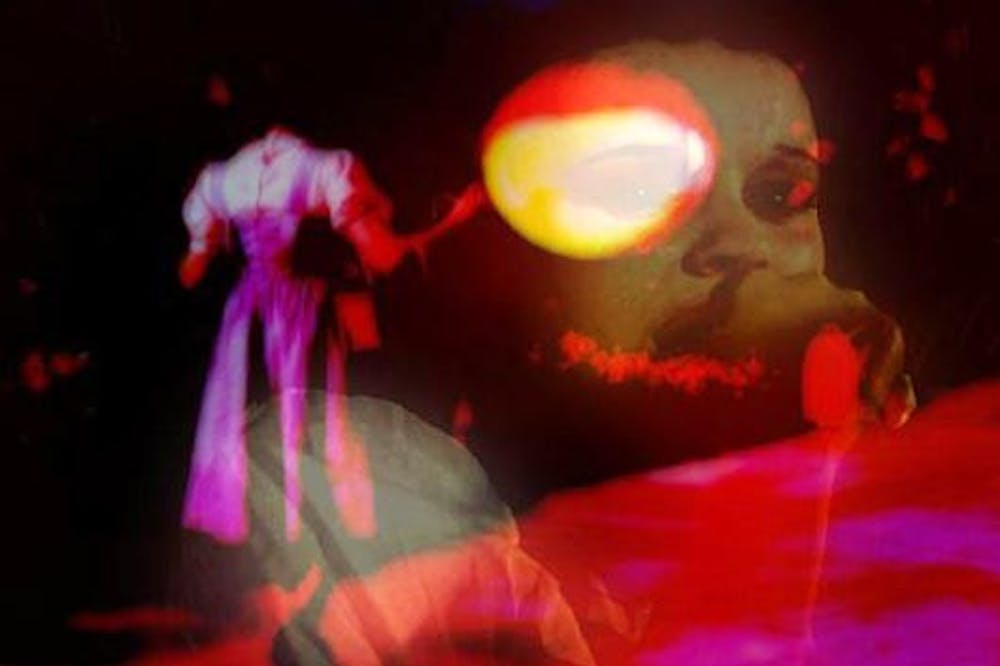“Welcome to Solomania,” said Melinda Barlow, Associate Professor of Cinema Studies and Moving Image Arts at the University of Colorado. This was said not at the beginning or end of her introduction, but in the middle, which foreshadowed the way the evening honoring the late great artist would progress.
At 7 p.m. Thursday, Sept. 19, 2024, people trickled into the Rubenstein Arts Center Film Theater for “Lodestar: Phil Solomon, in Memoriam,” an event remembering and celebrating the life of American experimental filmmaker Phil Solomon, who lived from 1954 to 2019. The theater was only a third full, but those in attendance remained captive for the entire hour-long program.
Nothing shown at the event was straightforward. Every short film, every poem and every story was told unconventionally — a hallmark of the genre of experimental filmmaking, which Phil Solomon was involved in throughout his life. One way to conceptualize the experimental film genre is as the film equivalent of abstract poetry; it is often difficult to understand at first, but that complication is an aspect of the art.
Barlow described the program she had assembled as an “interdisciplinary collage,” which she started working on during the summer of 2019, shortly after Solomon’s death. The program consisted of five short films, but only one was by Solomon himself. While that may seem like a strange choice, since the event was supposed to be a celebration of his own life, it was purposeful. By showing the work of his students, mentors and friends, the event demonstrated how this one man’s life is represented by not just his work, but also the work of those who inspired him and who he inspired.
Though none of the films were narratively straightforward, they demonstrated the profoundness of the art of editing, especially the 2008 film “Once in a Lullaby” by Joshua Minor, a former student of Solomon. The film was a “distilled” version of “The Wizard of Oz,” as Dr. Barlowe put it, a retelling of the story in his own way using shots from the original film.
Dr. Barlowe used terms like “super-Solomonic” during her interludes between the films, as though speaking to a crowd of people who were all fully aware of this man’s life and work. His name was repeated throughout the event as though it was not a public event, but a memorial for an in-group, the people who already knew of him and his life’s work. It was clear that the screening was not meant to further his legacy, but rather to keep his image cherished among those who already admired his work, which it certainly succeeded in doing.
One of the more unique pieces that was shown was by Solomon’s friend and colleague, David Gatten, called “Film for Invisible Ink, Case No. 142: Abbreviation for Dead Winter [Diminished by 1,794]”. It was 13 minutes of black and white 16mm film showing fibers from just a single piece of paper. Throughout these short films, the audience stared, utterly engrossed by even just fibers of paper. Some had their hands up to their chins, as though they were pondering the meaning of life.
The highlight of the event was the film that Solomon made in 1999 as a gift for Barlow when she married her partner, called “Yes, I Said Yes, I Will, Yes”. It was a beautiful and abstract piece, set to the song “I’m Putting All My Eggs in One Basket” by Fred Astaire and depicting a couple doing activities such as biking, dancing, and walking together. This was the film that Barlow spoke the least about, letting it stand on its own.
The evening ended not with a formal academic Q&A session, but rather a conversational chat with Barlow, open to any audience members who wanted to stick around and ask questions. When asked what brought her to Duke and Durham, she responded that this was a place with an audience for experimental films, and this was her way of giving back to the experimental filmmaking community. She recommended that students interested in experimental filmmaking see as much film as possible, on any platform they have access to, but particularly in theaters and screening rooms. She also emphasized the importance of getting to know people in the industry and going to film festivals.
In a way, Solomon’s direct presence throughout the evening was quite minimal, but the ideas he worked with and stood for carried through every moment. Overall, the program was a profound snippet of the life of Phil Solomon and experimental film making.
Get The Chronicle straight to your inbox
Signup for our weekly newsletter. Cancel at any time.

